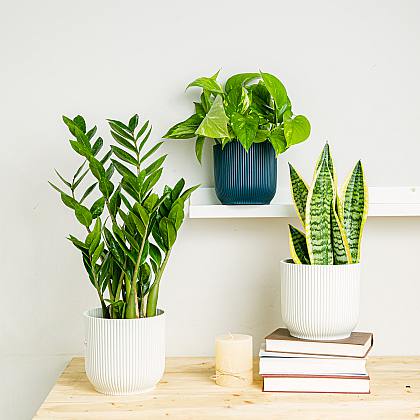Improve your soil structure with organic fertilizers and keep your plants healthy
Did you know that the secret to having a vibrant garden and healthy plants is in the structure of the soil? If you want to find out how to improve it, don't...
Did you know that the secret to having a vibrant garden and healthy plants is in the structure of the soil? If you want to find out how to improve it, don't miss this article. In addition, I will tell you all about organic fertilizers and how they can benefit your plants. You'll also learn how to make your own homemade compost. And that's not all, because I'll give you tips to keep your plants always vigorous. Are you ready to know all these green secrets? Join me on this gardening adventure!
The Importance of Good soil structure for Plant Growth
Good soil structure is essential for plants to grow properly and healthily. Why? As it turns out, the soil acts as a kind of home for plant roots, providing them with support, water, and nutrients necessary for their development. If the soil does not have a proper structure, the roots will not be able to penetrate it easily and this will hinder its growth. In addition, compacted or poorly structured soil can hold too much water, which can lead to waterlogged roots and suffocation of plants. On the other hand, a good soil structure allows air to circulate freely between its particles, which is vital for the roots to breathe properly. It also facilitates the drainage of excess water, avoiding waterlogging problems. In summary, good soil structure is essential to ensure that plants have access to the nutrients and water needed to grow and develop optimally. Therefore, it is important to take care of and improve the structure of the soil in our garden or orchard, using techniques such as the addition of organic fertilizers and avoiding practices that can damage its structure, such as the excessive use of heavy machinery.
Benefits of using organic fertilizers in your garden
Using organic fertilizers in your garden has numerous benefits that you can't overlook. These natural fertilizers are an excellent option for improving the health of your plants and promoting vigorous growth. By using organic fertilizers, you are providing your plants with essential nutrients naturally, which is essential for their optimal development. In addition, these fertilizers are much friendlier to the environment than chemical fertilizers, as they do not contain toxic or harmful substances for the earth and the living organisms present in it.
One of the most outstanding advantages of organic fertilizers is that they improve the structure of the soil, which favors the retention of water and nutrients. This is especially important in poor or compacted soils, as it allows plant roots to develop properly and absorb the nutrients needed for their growth. In addition, organic fertilizers also help increase microbial activity in the soil, which is essential for breaking down organic matter and releasing nutrients available to plants.
Another important benefit of using organic fertilizers is that they promote microbial life in the soil. The beneficial microorganisms present in these fertilizers help to break down organic matter, releasing nutrients and helping to maintain a biological balance in the soil. Not only does this improve the health of your plants, but it also helps conserve the environment by reducing the need for synthetic chemicals.
In short, using organic fertilizers in your garden is an effective and eco-friendly way to improve the health of your plants and maintain fertile and healthy soil. Not only will you be taking care of your plants, but also the environment. Dare to try them and enjoy the benefits they will give you!
Types of organic fertilisers and how to use them correctly
There are different types of organic fertilizers that you can use in your garden to improve soil structure and keep your plants healthy. One of the most common is compost, which is obtained from organic materials such as food scraps, leaves, and grass clippings. To use it properly, you simply need to mix it with the soil around your plants or use it as a cover on the surface. Another option is manure, which can come from animals such as cows, horses, or birds. This type of compost should be thoroughly broken down before use, as fresh manure can burn plant roots. You can also opt for liquid fertilizers such as worm castings, which are obtained from the waste processed by worms. This fertilizer is diluted in water and applied directly to the plants. Remember to follow the manufacturer's instructions to use these fertilizers correctly and avoid overfeeding your plants. In addition, it is important to note that each type of plant may require a specific type of organic fertilizer, so it is advisable to research which one is most suitable for your crops. By using organic fertilizers, you'll be nourishing your plants naturally and promoting microbial life in the soil, which will help maintain a healthy garden full of life.
How to Make Your Own Homemade Organic Fertilizer
Making your own homemade compost can be a rewarding and exciting experience for any plant lover. Not only will you be providing your plants with the nutrients they need, but you'll also be reducing your carbon footprint and contributing to a healthier environment. To make your own compost, you can use kitchen scraps such as fruit and vegetable peels, coffee grounds, or even fallen leaves. These organic materials decompose over time and become a rich natural fertilizer. A popular option is to make a compost bin in your garden or balcony, where you can deposit all this waste and let nature do its work. Make sure to mix the materials well and keep the compost bin moist but not too wet. It's also important to turn the pile over from time to time to make sure everything breaks down properly. If you don't have space for a compost bin, another option is to make compost tea. Simply place the organic waste in a bucket of water and let it sit for a few days. You can then use this liquid as a fertilizer for your plants. Making your own homemade compost is not only an inexpensive way to care for your plants, but it also allows you to connect with nature and make a positive impact on the environment. So don't hesitate to give it a try and see how your plants bloom thanks to your love and dedication!
Tips for Keeping Your Plants Healthy and Vigorous
To keep your plants healthy and vigorous, it's important to follow some practical tips. First, make sure you're providing them with enough water, but avoid too much as it can lead to root rot. Observe the needs of each plant and water accordingly. Also, don't forget the importance of sunlight. Place your plants in places where they can receive the right amount of light for their growth. Another recommendation is to provide them with nutrient-rich soil. Use organic fertilizers to improve soil structure and nourish your plants naturally. It's also important to control pests and diseases that can affect your plants. There are organic products available on the market that can help you protect them without harming the environment. Finally, don't forget to regularly prune your plants to stimulate their growth and maintain proper shape. By following these tips, you will be able to enjoy healthy and vigorous plants in your garden, filling your space with beauty and vitality.
The Role of Organic Fertilizers in Environmental Conservation
Organic fertilisers play a key role in environmental conservation. By using these types of natural fertilizers, we are avoiding the use of chemicals that are harmful to the soil and water. Organic fertilizers are biodegradable and do not pollute or negatively affect ecosystems. In addition, by employing these fertilizers, we are promoting the health of soils by improving their structure and increasing their water and nutrient holding capacity. This helps prevent soil erosion and maintain soil fertility in the long term.
Another important aspect is that organic fertilizers help reduce the amount of organic waste that ends up in landfills. Instead of discarding food scraps or pruning, we can turn them into valuable fertilizers for our plants. In this way, we are closing the nutrient cycle and avoiding the generation of greenhouse gases associated with the decomposition of this waste in landfills.
Using organic fertilizers also encourages biodiversity and promotes microbial life in the soil. Beneficial microorganisms feed on the nutrients present in the compost, further improving soil quality and creating a favorable environment for plants.
In short, organic fertilisers are a sustainable and environmentally friendly alternative. By using them, we are helping to conserve our natural resources, reduce pollution and promote greener agriculture.
Sustainable Practices to Care for the Soil and Promote Microbial Life
When it comes to caring for the soil and promoting microbial life, it's important to adopt sustainable practices that are environmentally friendly. One of the most effective ways to achieve this is to avoid the use of synthetic chemicals in our garden. Instead, we can opt for organic fertilizers that will not only nourish our plants, but also benefit the microorganisms in the soil. In addition, it is crucial to avoid overexploitation of the soil and allow it to recover between crops. Rotating crops and using cover crops will help maintain soil health and provide additional nutrients as they decompose. Another important aspect is water conservation. Using efficient irrigation techniques, such as drip irrigation, can minimize waste and preserve this vital resource. We should also avoid soil compaction, as this can hinder the circulation of air and water, as well as the growth of roots. Finally, encouraging plant diversity in our garden will help promote greater biodiversity of beneficial microorganisms for the soil. By implementing these sustainable practices, we will not only be taking care of our soil and promoting microbial life, but we will also be contributing to the conservation of the environment and keeping our plants healthy and vigorous.
Improve your soil structure with organic fertilizers and keep your plants healthy! Now that you know the importance of good soil structure, the benefits of using organic fertilizers, the different types available, and how to make your own homemade fertilizer, as well as tips for keeping your plants vigorous, it's time to put everything you've learned into practice. Remember that organic fertilizers are not only beneficial for your plants, but also for the environment, as they contribute to the conservation and promotion of microbial life in the soil. So go ahead and take action and experiment with these sustainable methods of caring for your garden! What other sustainable methods do you know of to improve the health of your plants? Share your ideas and keep exploring new ways to maintain a healthy garden full of life!


